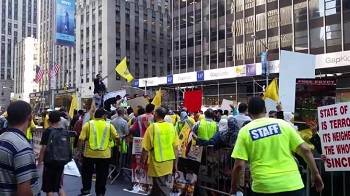Muslim groups in the U.S. have condemned the West’s complacency towards the Egyptian regime on the second anniversary of the “Rabaa” massacres.
On Aug. 14, 2013, Egyptian security forces opened fire on two protest camps in Cairo, killing at least 1,150 people, according to Human Rights Watch.
The protest camps in Cairo’s Rabaa al-Adawiya and Nahda squares were in support of Mohamed Morsi, Egypt’s first democratically elected president who had been ousted in a military coup weeks earlier.
Oussama Jammal, secretary general of the U.S. Council of Muslim Organizations, drew attention to the continuing abuses allegedly committed under Abdel-Fattah al-Sisi, a former army chief who assumed the Egyptian presidency in mid-2014.
Claiming there had not been any investigation into the Rabaa killings, Jammal told Anadolu Agency: "We are even more disappointed with the international community for its silence and complete ignorance or neglect of this gross violation. By doing so, their simple message to the people in the Middle East is that democracy is not important.
“What's important is, if you have power and if you can violate human rights, you can use violence and you can survive. This is the wrong message.”
He added that the “continuing silence of the international community has sent a very bad message to the regime in Egypt”.
Naeem Baig, president of Islamic Circle of North America, described Sisi’s two-year grip on power as “shameful” and attacked Egypt’s judicial system under Sisi.
“They [the courts] have no legal process; there is no justice and, sadly speaking, many global powers are just silent on that," he told Anadolu Agency.
Following Morsi’s ouster, Egypt-U.S. relations soured, with Washington suspending $1.3 billion in annual military aid to Egypt. Bilateral ties have since recovered with the U.S. announcing the resumption of its annual military aid package earlier this year.
In early August, Egypt and the U.S. resumed “strategic dialogue” talks after a six-year hiatus, during which U.S. Secretary of State John Kerry announced the delivery of new F-16 fighter jets, Apache helicopters and armored vehicles to Egypt.
Emad El-Din Shahin, a visiting professor at Washington’s Georgetown University, said the lack of “genuine and real pressure” on Sisi meant the human rights situation in Egypt was unlikely to improve.
“There isn't domestic pressure as well,” he said. “Also, he [Sisi] managed to polarize society and feed or thrive on the fear that he created inside society. So I don't think there will be any improvement in the near future unless this comes as part of a larger criticism.”
Jammal thanked Turkey - which has consistently criticized Morsi’s ouster and subsequent imprisonment by Egypt’s military-backed authorities - for “living up to the principles” and supporting democracy in Egypt, while Baig described Turkey's stance as “very commendable”.
Since Morsi's removal, the Egyptian authorities have launched a harsh crackdown on dissent that has largely targeted Morsi's supporters, leaving hundreds dead and thousands behind bars.
PHOTO CAPTION
A large crowd gathered in New York City on August 14 calling for justice for the people who died in the Rabaa Massacre.
AA


 Home
Home Discover Islam
Discover Islam Quran Recitations
Quran Recitations Lectures
Lectures
 Fatwa
Fatwa Articles
Articles Fiqh
Fiqh E-Books
E-Books Boys & Girls
Boys & Girls  Ramadan
Ramadan Fatwa Audios
Fatwa Audios Month of Mercy
Month of Mercy Women
Women Eed Al- Fitr
Eed Al- Fitr Food Recipes
Food Recipes Videos
Videos

 Prayer Times
Prayer Times












